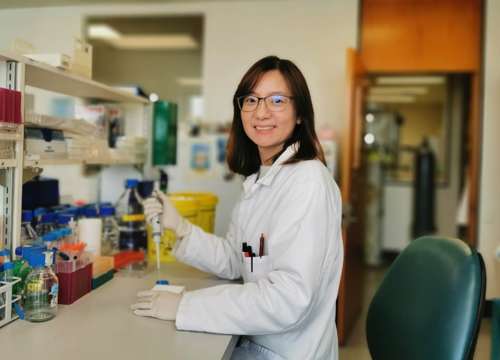A step towards precision medicine for Māori and Pacific Peoples
Research funded through the MWC Metabolic Health research theme programme has led to the understanding of how a gene variant unique to Māori and Pacific could impact the way first line drug treatment is managed for people with type 2 diabetes.

Dr Qian (Claire) Wang.
This work developed from the MWC Metabolic Health theme’s efforts to identify new strategies for precision medicine for Māori and Pacific peoples. That work involving many MWC researchers, The Moko Foundation and Ngāti Porou Oranga identified the rs8187715 variant in the SLC22A3 gene, which, while very rare in other parts of the world, is present at a frequency of over 15% in Māori and Pacific peoples. Based on population size, there may be more than 200,000 carriers of the variant here in Aotearoa New Zealand.
Further research to understand the impact of this gene variant was initiated by MWC Deputy Director Professor Peter Shepherd and Affiliate Investigator Dr Qian (Claire) Wang, a Research Fellow at the University of Auckland. They explored whether this variant affected the efficacy of metformin, a drug known to be transported into cells by the SLC22A3 protein. Metformin is the first-line treatment for type-2 diabetes and so is used by virtually all such patients.
With MWC support, Dr Wang developed a genetic mouse model of this variant to look at the impacts on metformin pharmacokinetics and subsequent effects on insulin sensitivity in vivo.
She found that while the rs8187715 variant of SLC22A3 has no effect on many metabolic parameters, it is a gain-of-function variant that increases the uptake and disposal of metformin in animal models. This promoted insulin sensitivity with an acute dose model. Surprisingly, longer-term metformin treatment was less effective in variant knock-in animals regardless of whether they were fed with normal or high-fat diets.
Claire says that if this variant has a similar impact on the clinical response to metformin treatment in people, then it may be an ancestral-specific genetic biomarker to guide precision medicine strategies of metformin treatment in type-2 diabetes. Clinical studies to investigate this are currently being developed by the MWC. In the future, this could direct better use of metformin for Māori and Pacific people who carry the variant and who have type 2 diabetes.
Claire has also worked with MWC researcher Prof. Sally McCormack at Otago University to show that this gene variant is highly predictive for levels of an important blood marker of cardiovascular disease risk, called Lipoprotein (a). In further work she is collaborating with Prof Peter Mace, another MWC researcher, to understand the mechanism by which this gene variant has its effects.
Another avenue of research on the horizon is understanding how the rs8187715 variant impacts the efficacy of other drugs. Remarkably, a number of other drugs such as the platinum-based chemotherapy drugs, are known to be transported into cells by this important drug transport protein. Understanding how the variant affects the efficacy of these drugs will be critical in optimising cancer treatment approaches for Māori and Pacific patients. A wide range of other MWC researchers are now involved in developing studies to investigate this.
“This work has made a significant contribution to the emerging field of precision medicine and identifies impacts of a gene variant of significance for Māori and Pacific peoples.”
“This is important as the development of precision medicine strategies globally is being done using information gleaned almost exclusively from studies in Europe and the USA, which would have excluded such information. Unless this work is done here, our populations will miss out on advances in precision medicine derived from genomic studies”.